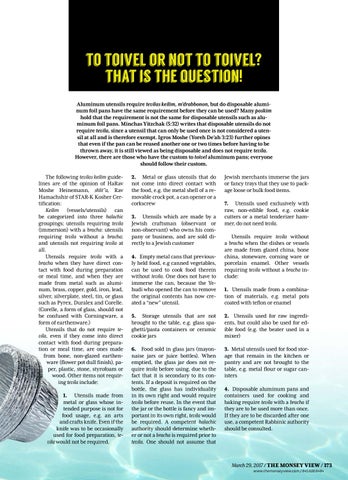to toivel or not to toivel? that is the question! Aluminum utensils require tevilas keilim, m’drabbonon, but do disposable aluminum foil pans have the same requirement before they can be used? Many poskim hold that the requirement is not the same for disposable utensils such as aluminum foil pans. Minchas Yitzchak (5:32) writes that disposable utensils do not require tevila, since a utensil that can only be used once is not considered a utensil at all and is therefore exempt. Igros Moshe (Yoreh De’ah 3:23) further opines that even if the pan can be reused another one or two times before having to be thrown away, it is still viewed as being disposable and does not require tevila. However, there are those who have the custom to toivel aluminum pans; everyone should follow their custom. The following tevilas keilim guidelines are of the opinion of HaRav Moshe Heinemann, shlit”a, Rav Hamachshir of STAR-K Kosher Certification: Keilim (vessels/utensils) can be categorized into three halachic groupings; utensils requiring tevila (immersion) with a bracha: utensils requiring tevila without a bracha; and utensils not requiring tevila at all. Utensils require tevila with a bracha when they have direct contact with food during preparation or meal time, and when they are made from metal such as aluminum, brass, copper, gold, iron, lead, silver, silverplate, steel, tin, or glass such as Pyrex, Duralex and Corelle. (Corelle, a form of glass, should not be confused with Corningware, a form of earthenware.) Utensils that do not require tevila, even if they come into direct contact with food during preparation or meal time, are ones made from bone, non-glazed earthenware (flower pot dull finish), paper, plastic, stone, styrofoam or wood. Other items not requiring tevila include: 1. Utensils made from metal or glass whose intended purpose is not for food usage, e.g. an arts and crafts knife. Even if the knife was to be occasionally used for food preparation, tevila would not be required.
2. Metal or glass utensils that do not come into direct contact with the food, e.g. the metal shell of a removable crock pot, a can opener or a corkscrew 3. Utensils which are made by a Jewish craftsman (observant or non-observant) who owns his company or business, and are sold directly to a Jewish customer
Jewish merchants immerse the jars or fancy trays that they use to package loose or bulk food items. 7. Utensils used exclusively with raw, non-edible food, e.g. cookie cutters or a metal tenderizer hammer, do not need tevila.
Utensils require tevila without a bracha when the dishes or vessels are made from glazed china, bone china, stoneware, corning ware or porcelain enamel. Other vessels requiring tevila without a bracha include:
4. Empty metal cans that previously held food, e.g canned vegetables, can be used to cook food therein without tevila. One does not have to immerse the can, because the Yehudi who opened the can to remove the original contents has now created a “new” utensil.
1. Utensils made from a combination of materials, e.g. metal pots coated with teflon or enamel
5. Storage utensils that are not brought to the table, e.g. glass spaghetti/pasta containers or ceramic cookie jars
2. Utensils used for raw ingredients, but could also be used for edible food (e.g. the beater used in a mixer)
6. Food sold in glass jars (mayonnaise jars or juice bottles). When emptied, the glass jar does not require tevila before using, due to the fact that it is secondary to its contents. If a deposit is required on the bottle, the glass has individuality in its own right and would require tevila before reuse. In the event that the jar or the bottle is fancy and important in its own right, tevila would be required. A competent halachic authority should determine whether or not a bracha is required prior to tevila. One should not assume that
3. Metal utensils used for food storage that remain in the kitchen or pantry and are not brought to the table, e.g. metal flour or sugar canisters 4. Disposable aluminum pans and containers used for cooking and baking require tevila with a bracha if they are to be used more than once. If they are to be discarded after one use, a competent Rabbinic authority should be consulted.
March 29, 2017 / THE MONSEY VIEW / 173 www.themonseyview.com / 845.600.8484
